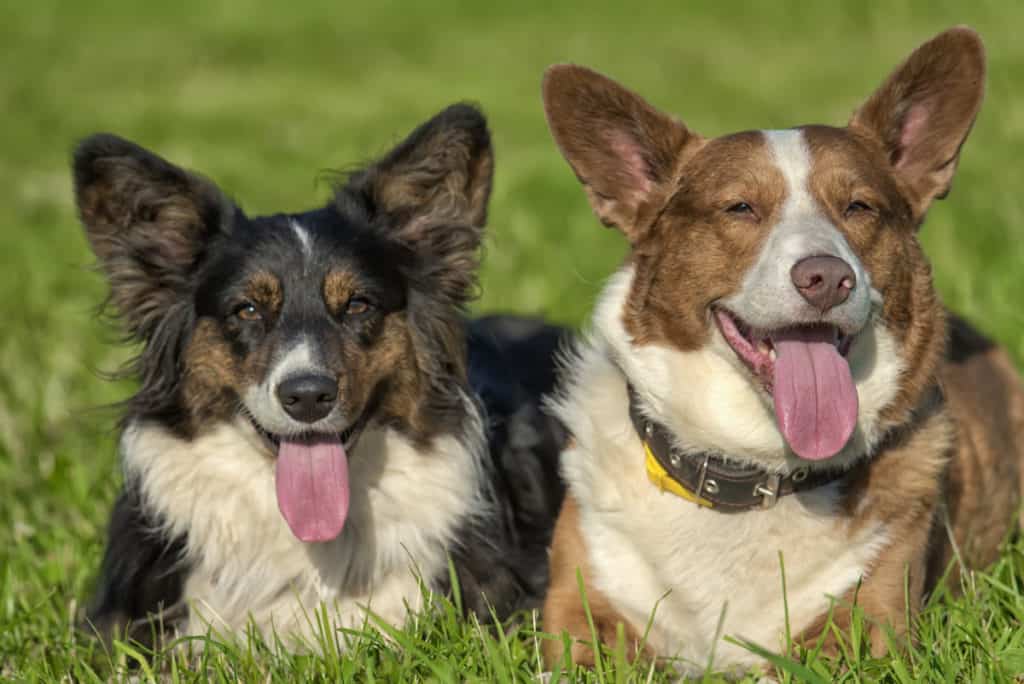There are Two Types of Corgi Breeds
The Welsh Corgi was registered as one breed by the Kennel Club in the UK until 1934 when they decided to separate the breeds into two. Both the Pembroke Welsh and Cardigan Corgis are similar in attributes but differ slightly in features, such as height and weight.
The Cardigan is slightly larger and has a longer tail, while the Pembroke seems to have a short or no tail at all. Their ears also look different, with the Cardigan having a more round-shaped pair of ears, with the Pembroke having a sharper pair of ears.
Pembroke Welsh Corgi
The Pembroke Corgi weighs around 20 to 30 pounds, and typically not any heavier. Its height is typically at 10″ to 12,” and its lifespan runs around 12 to 13 years. Their coat colors can range from red, sable, or tri-colored, such as tan, black, and red, and usually with white markings on the legs, chest, belly, and muzzle.
Cardigan Welsh Corgi
The Cardigan Welsh Corgi is a little taller and heavier than the Pembroke. Its height can go for over 12,” around 13,” and its weight can reach about 38 lbs. It can also have a longer body, a heavier head, and bigger ears. Its coat can have the colors red, blue merle, brindle, or black, and usually with white markings.

Personality and Temperament
Corgis are known for being extremely affectionate, which is why families love them. They are incredibly loyal because they see the family as part of the herd. They do well in most family settings and can adapt well in different kinds of households, be it an apartment dwelling, a single-family home, or on a farm.
One of their most desired traits is that they make for great watchdogs. Though small in size, the Corgi packs a punch when it comes to their bark. They have loud barks that make them great watchdogs for your home or your kids.
Furthermore, Corgis love attention and will most likely follow you around the house as you do your chores. They are incredibly loving and love to cuddle, while also love to be around other animals and people.
Corgis, however, can get bossy and independent. They assert what they want and won’t back down from a fight. You will have to be firm in your decision or commands when you interact with your Corgi because they can get a little assertive, but rarely aggressive.
And because of their natural need to be around animals and people, they don’t like it when they are left alone for long periods. As they were originally trained to be herding dogs, their natural environment was always around a herd, which means their breed was rarely left alone.
When you leave them alone for a long time, such as more than 10 hours in a day, they can get anxious and depressed. When this happens, they can become destructive and start to make a mess in the home, such as ruining furniture, biting on shoes, and the like.
Corgi Energy Levels and Exercise Needs
The Corgi is known for having lots of energy. Again, as a herding dog, they were required to run around large open spaces, and always on the lookout for other animals in the field. They need daily, regular exercise to dispense their unlimited source of energy, otherwise, they can become irritable and unhappy. They do become destructive and aggressive when their attention and exercise needs are not met.
If you have a yard, allow your Corgi to run around at least twice a day – once in the morning and once in the afternoon or evening. If you don’t have an outdoor space, give them a walk in the morning before you head for work, and once when you get home. They are known to be high maintenance dogs because of their energy levels and exercise needs, so pet parents would have to be committed to provide this level of attention and care for Corgis.
While Corgis have lots of energy and love running around, they are not meant for long-distance running as they are short in stature. This means that long-distance running or bicycle rides are not ideal for them. Short distances are perfect for their agile abilities.

Corgi Intelligence and Trainability
One of the reasons why Corgis make for greater herding dogs is because they are highly trainable and intelligent. Their need for attention and eagerness to please make them great students in obedience and socialization classes.
They are also born with boldness and that means they are great for agility and other training classes. Training must start early with Corgis so they won’t have problems interacting with other animals and people once they grow older.
Friendliness Towards Humans and Animals
Corgis are generally personable and friendly. They are great pets for those who constantly have visitors, such as in an apartment building, or those who have roommates. However, they won’t be naturally friendly, because as mentioned earlier, they usually bark at other animals and people with whom they are not familiar. And they do have a loud bark, which can startle both people and animals.
They would need to be socialized early in their lives to be able to display their natural friendly tendencies. If you adopt a Corgi as a puppy, introduce other animals early on, as well as other people. Make them get used to other pets in the house, guests, as well as other animals such as cats.

